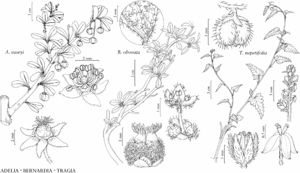Bernardia
Gard. Dict. Abr. ed. 4, vol. 1. 1754.
| Taxon | Illustrator ⠉ | |
|---|---|---|
 | Tragia nepetifolia Bernardia obovata Adelia vaseyi | Barbara Alongi Barbara Alongi Yevonn Wilson-Ramsey |
Shrubs [herbs or subshrubs], dioecious [monoecious]; hairs stellate [unbranched or absent]; latex absent. Leaves persistent, alternate, simple; stipules present, persistent or caducous; petiole present [absent], glands absent; blade unlobed, margins coarsely crenate to crenate-serrate [serrate or entire], laminar glands usually abaxial, proximal, crateriform, occasionally absent on some leaves [absent]; venation pinnate (with strong secondary-veins ascending from base). Inflorescences unisexual, axillary, often on short, lateral shoots; staminate spicate thyrses, pistillate flowers solitary [terminal spikes]; glands subtending bracts 0. Pedicels: staminate present, pistillate absent [present]. Staminate flowers: sepals 3 (–4), valvate, distinct; petals 0; nectary intrastaminal, 1 to several glands; stamens 3–15 (–20) [–50], ± straight in bud, distinct; pistillode absent. Pistillate flowers: sepals 3–5, distinct; petals 0; nectary absent [present]; pistil 2–3-carpellate; styles 2–3, distinct, 2-fid, branches flattened, adaxial surface stigmatic. Fruits capsules. Seeds subglobose; caruncle absent. x = 13.
Distribution
sw, sc United States, Mexico, West Indies, Central America, South America
Discussion
Species ca. 70 (3 in the flora).
The species that occur in the flora area are distinct from most species of the genus in being shrubs with relatively small leaves and stellate vestiture; most Bernardia species are perennial herbs or subshrubs. The rounded shrubs native to the flora area grow well in cultivation and would make attractive native borders within their range.
Selected References
None.
Lower Taxa
Key
| 1 | Leaf blade abaxial surfaces green, sparsely spreading stellate-pubescent, veins not prominent abaxially; pistils 2-carpellate. | Bernardia obovata |
| 1 | Leaf blade abaxial surfaces grayish white, densely appressed and/or spreading stellate-pubescent, veins prominent abaxially; pistils 3-carpellate. | > 2 |
| 2 | Stipules persistent, yellowish brown to black, bases thickened, with dark resinous exudate; stamens (3–)5–7. | Bernardia incana |
| 2 | Stipules caducous, green to straw colored, bases not thickened, without dark resinous exudate; stamens (10–)12–15(–20). | Bernardia myricifolia |
"connate" is not a number. "distinct" is not a number.